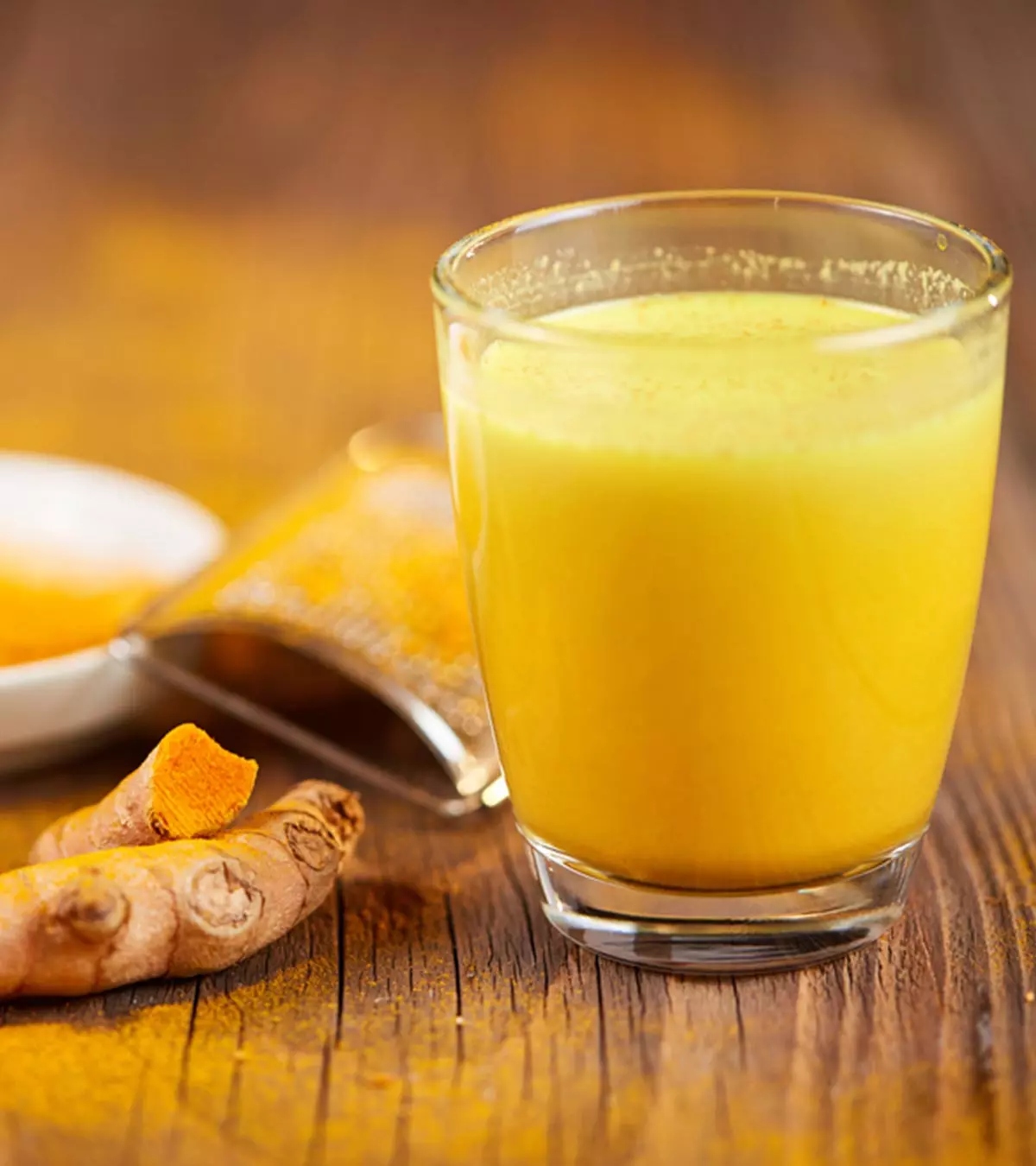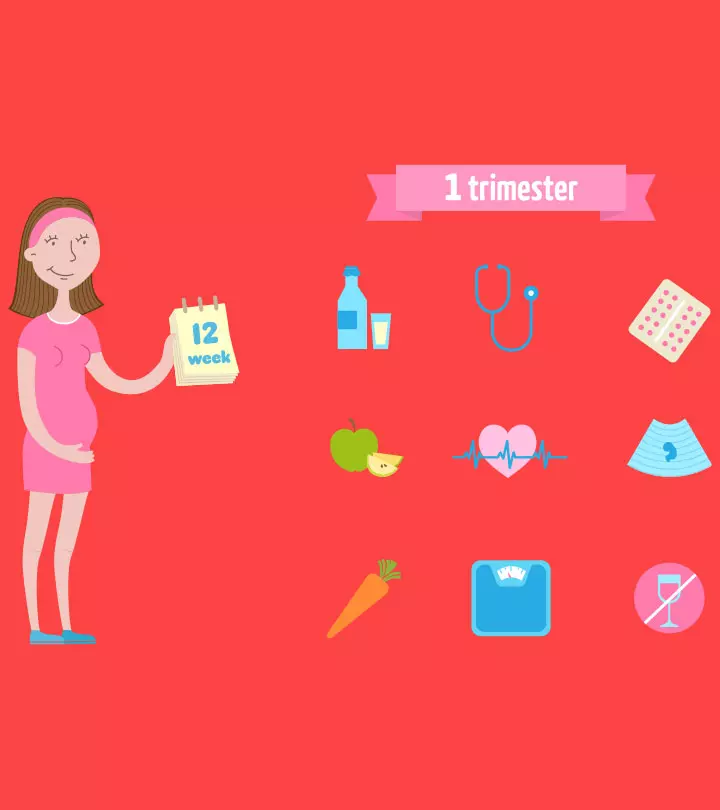
Shutterstock
Heartburn, also known as acid reflux, is a common experience in pregnancy. Heartburn during pregnancy affects most pregnant women at least once and may occur in any trimester (1). Pregnancy heartburn is characterized by a burning sensation near the chest, throat, and upper digestive tract.

Read on to learn more about the causes, symptoms, treatment, and remedies for heartburn in pregnancy.
Key Pointers
- Heartburn during pregnancy can begin during any trimester but usually worsens in the third trimester.
- Hormonal changes and the growing uterus are usually the most common triggers.
- Treatment can be done with doctor-prescribed medications and through some simple home remedies.
- Eating small portions of meals, avoiding spicy foods, and drinking adequate fluids are a few ways to prevent heartburn or acid reflux during pregnancy.
Does Pregnancy Cause Heartburn?
Women who never had heartburn before may encounter this problem as one of the pregnancy symptoms they face during their pregnancy. Experts believe that pregnancy hormones (especially estrogeniA sex hormone responsible for the development of female sexual characteristics and progesteronei A female reproductive hormone that plays an important role in menstruation, pregnancy, and breastfeeding ) and the baby’s growing size might have a role to play in this development (2).
How Common Is Heartburn During Pregnancy?
A research study states that around 17 to 45 percent of pregnant women may have heartburn during pregnancy. The prevalence of heartburn is known to increase as the pregnancy progresses. Reportedly, the incidence of heartburn increased from 39% in the second trimester to 60% to 72% in the third trimester. In contrast, another study revealed that in some women, heartburn symptoms appeared in the first trimester and were reduced by the second trimester (3).
 Did you know?
Did you know?What Causes Heartburn During Pregnancy?
The cause of heartburn in pregnancy may be based on several factors. However, the most common causes of heartburn during pregnancy may include (3):
- Changing hormone levels:A sudden spike in hormone levels (especially progesterone) during pregnancy may hamper digestion and gastric motility, leading to gastrointestinal issues and the increased possibility of heartburn.

- Esophageal sphincter: The hormonal changes cause relaxation of the esophageal sphincter(a smooth muscle bundle at the top of the stomach), leading to reflux of stomach acids back into the esophagus.
- Gastritis: Gastritis is the inflammation of the stomach lining. If you experience this condition during pregnancy can lead to severe heartburn, bloating, and gas.
- Growing uterus: The growing uterus in pregnancy can press on your stomach, worsening heartburn. It is also why heartburn is frequent during the third trimester, when the baby and uterus are of the biggest size, congesting other organs, such as the stomach.
- Foods that cause heartburn: Certain foods such as fatty and spicy foods and caffeinated or carbonated drinks can trigger heartburn during pregnancy.
- Medications: Certain medications prescribed during pregnancy (such as drugs for nausea and vomiting) may cause heartburn.
- Infection: Helicobacter pyloriiA type of bacteria that can damage tissue in the stomach and the small intestine infection might increase the risk of developing problems in the stomach lining, including pain, burping, and stomach ulcers during pregnancy, which may lead to heartburn (4).
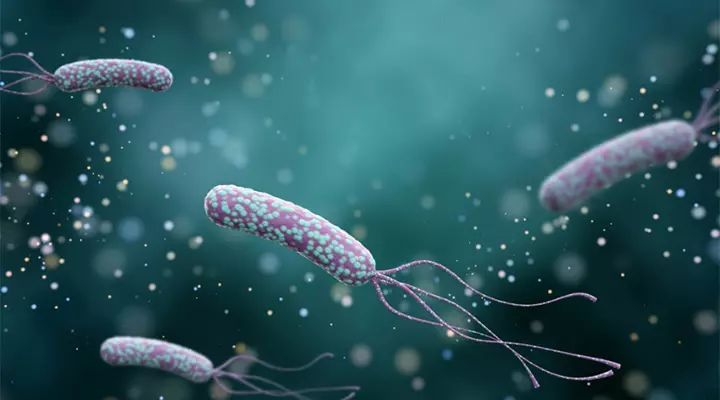
- Hernia: The growing uterus might push the stomach through the opening in the diaphragm called hiatus. This condition is known as hiatal hernia. This may severely constrict or block the food pipe, causing severe heartburn (5).
- Other causes: Other risk factors that might be associated with heartburn in pregnancy include smoking, alcohol intake, being overweight, sudden changes in diet, lying down soon after eating, stress, and a history of indigestion or heartburn before pregnancy (6).
What Are The Symptoms Of Heartburn During Pregnancy?
You may develop heartburn symptoms early in pregnancy due to hormonal changes or later during the third trimester due to the growing baby pushing up against your organs. However, the common symptoms of heartburn during pregnancy are (6) (7):
- A burning sensation in the chest or throat
- Pain in the chest

- Difficulty or pain in the throat while swallowing
- Feeling dizzy and lightheaded
- Constant burping or belching
- Feeling heavy or bloated
- Feeling sick
- A feeling of regurgitation of food
- Feeling anxious, profuse sweating
The symptoms of heartburn usually appear after having meals or liquids, but in some women, they may appear anytime, especially those in their third trimester.
 Quick fact
Quick factHow Is Heartburn During Pregnancy Treated?
You may incorporate certain lifestyle modifications before choosing medications to treat heartburn in pregnancy. However, if the symptoms are not manageable and become severe, then your doctor may prescribe pharmacologic therapy (8).
- Over-the-counter antacids: Antacids are the first line of treatment for heartburn in pregnancy. These acid-suppressing drugs help neutralize the stomach acid, controlling heartburn and providing immediate relief from symptoms. Some studies have shown that consuming high-dose antacids during pregnancy for a long time is not advisable and may pose certain risks to the mother and the baby (8). Therefore, contact your doctor for recommended dosage of antacids during pregnancy.
- H2 blockers: H2 blockersiMedicine that reduces the amount of acid produced by glands in the lining of the stomach and is effective drugs for peptic ulcers or Histamine-2 receptor antagonists (e.g.: cimetidine, ranitidine) are widely used to treat the symptoms of heartburn and acid reflux in pregnancy. Studies have demonstrated that these medications do not pose the risk of abortions or preterm birth and are safe to use during pregnancy (9).
- Proton pump inhibitors (PPIs): PPIs (e.g.: omeprazole, pantoprazole) are known to cause a prolonged reduction in stomach acid production. Moreover, research studies reveal that these medications are not associated with maternal-fetal risks and are safe to use during pregnancy (10).
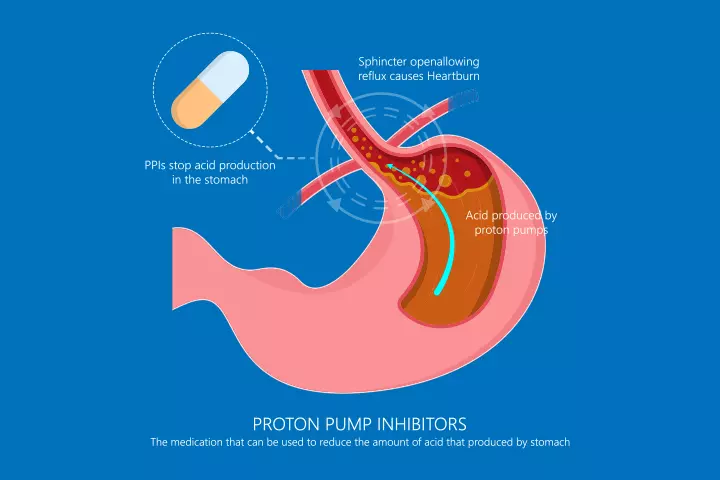
When To See A Doctor For Heartburn In Pregnancy?
If heartburn in pregnancy is not resolving despite home care and remedies, it is best to speak to your healthcare professional. Also, sometimes heartburn symptoms might resemble signs of serious medical conditions such as preeclampsia. Hence you must seek medical care if you experience (7) (11):
- Breathing difficulties
- Bowel changes
- Blood in vomiting
- Weight loss
- Sudden, severe pain in the chest, arm, or jaws
- Severe headache
- Vision problems
- Swelling in the face and extremities
Are There Home Remedies For Heartburn During Pregnancy?

Some home remedies might help reduce heartburn during pregnancy (12).
- Yogurt: Probiotics such as yogurt may help ease heartburn and digestive discomfort. You may include a cup of fresh yogurt in your meals.
- Milk and honey: The American Pregnancy Association recommends having a glass of warm milk with a tablespoon of honey; this might neutralize stomach acids and prevent stomach discomfort (13).
- Ginger: Ginger is known to be an effective remedy for an upset stomach; it may also reduce inflammation and prevent acid reflux. You may include ginger in your tea. Additionally, ginger may help reduce the severity of morning sickness in some people.
- Almonds: Nuts and dry fruits are low in acid levels. You can munch on a handful of almonds. The rich oil content in almonds may control gastric acid production and reduce heartburn.
- Sugar-free gum: Chewing on sugar-free gums can stimulate the production of saliva, which is known to neutralize stomach acids.
Cordelia Lee, a meditation teacher, sound healer & author, talks about dealing with heartburn during her pregnancy. She says, “I felt varying degrees of pain. I found relief by drinking kefir or taking some gastric medication. It worked at times, reducing the pain. Along the way, my husband did some research and suggested I try chia seeds. I gave it a shot, and it did help lessen the heartburn symptoms, though not a complete cure (i).”
How To Prevent Heartburn During Pregnancy?
Some ways that might help prevent heartburn during pregnancy are (7) (12):
- Slow eating: Gulping down your food quickly might increase the chances of acid reflux and indigestion. Hence chew well and eat your meal slowly.
- Clothing: Tight-fitting clothes may not just increase the chances of heartburn but also cause discomfort during pregnancy.
- Timing meals: Heartburn frequently occurs after a large meal. Hence you can have small, frequent meals timed throughout the day to prevent heartburn and hunger pangs.
- Avoiding certain foods: Spicy foods, chocolates, citrus fruits, fatty foods, pickles, and sauces may trigger heartburn. You may identify and avoid such reflux-inducing foods during pregnancy.
Lee adds, “I decided to stop indulging in fast food. I sought for alternative food as supper. This took me almost two months before my heartburn no longer affected me.”
- Bedtime eating: Lying down after eating may increase heartburn symptoms. Hence you may avoid eating or drinking (caffeinated drinks) for at least two hours before sleeping.
- Elevating head while sleeping: Prop up some pillows to keep your head elevated to ease heartburn symptoms. Also, sleeping on your left side might facilitate easy digestion.
- Avoiding certain medications: Certain medications may increase the risk of reflux and heartburn. Avoid taking any non-steroidal anti-inflammatory drugs or medications if your doctor does not prescribe them.
- Smoking or alcohol intake: Women who smoke or drink alcohol may be at higher risk of having heartburn during pregnancy. Hence you may refrain from smoking or drinking alcohol during pregnancy.
- Taking plenty of fluids: Drink plenty of water, but make sure to have a short gap for drinking water after meals. Also, you may have fresh coconut water and fresh fruit juices throughout the day to maintain good hydration levels.
- Keeping a check on body weight: Keep a check on your weight. Maintain appropriate BMI to stay fit and avoid indigestion and reflux issues.
 Research finds
Research findsFrequently Asked Questions
1. Can I take over-the-counter antacids to relieve heartburn during pregnancy?
Antacids provide immediate relief from heartburn; hence you may take antacids after consulting your physician. Evidence suggests that the prescribed use of antacids is safe during pregnancy (14).
2. Does heartburn during pregnancy mean my baby will be born with hair?
Some studies have shown that there is a link between baby hair and heartburn. Reportedly hormone surge during pregnancy that causes heartburn might also be associated with increased hair growth in newborns (15).
3. When does pregnancy heartburn start?
Studies state that some women may experience heartburn during the first (around 26%) and second trimester (around 36%), while most reported heartburn in the final trimester (around 51%) (11).
4. Does ice cream help heartburn during pregnancy?
Ice cream might help some with heartburn. Since it is a high-fat dairy product, it is usually considered a food item that may potentially exacerbate acid reflux (16). But some individuals might have the opposite effect, so you may check if it works for your heartburn or not.
Heartburn during pregnancy could be a minor problem, but it can get troublesome. Although the symptoms may be short-lived and resolve spontaneously, sometimes severe heartburn may indicate an underlying condition. Hence it is important to inform your doctor if you are concerned about frequent heartburn during pregnancy to get timely interventions and get rid of the irksome symptoms of this health issue.
Infographic: How To Prevent Heartburn During Pregnancy?
Heartburn is certainly not a pleasant occurrence during pregnancy as you can neither satiate your cravings nor will it let you sleep peacefully. So, browse the suggestions in the infographic below and try following them to alleviate this annoying condition during pregnancy.
Some thing wrong with infographic shortcode. please verify shortcode syntaxIllustration: Heartburn During Pregnancy: Causes Symptoms And Treatment
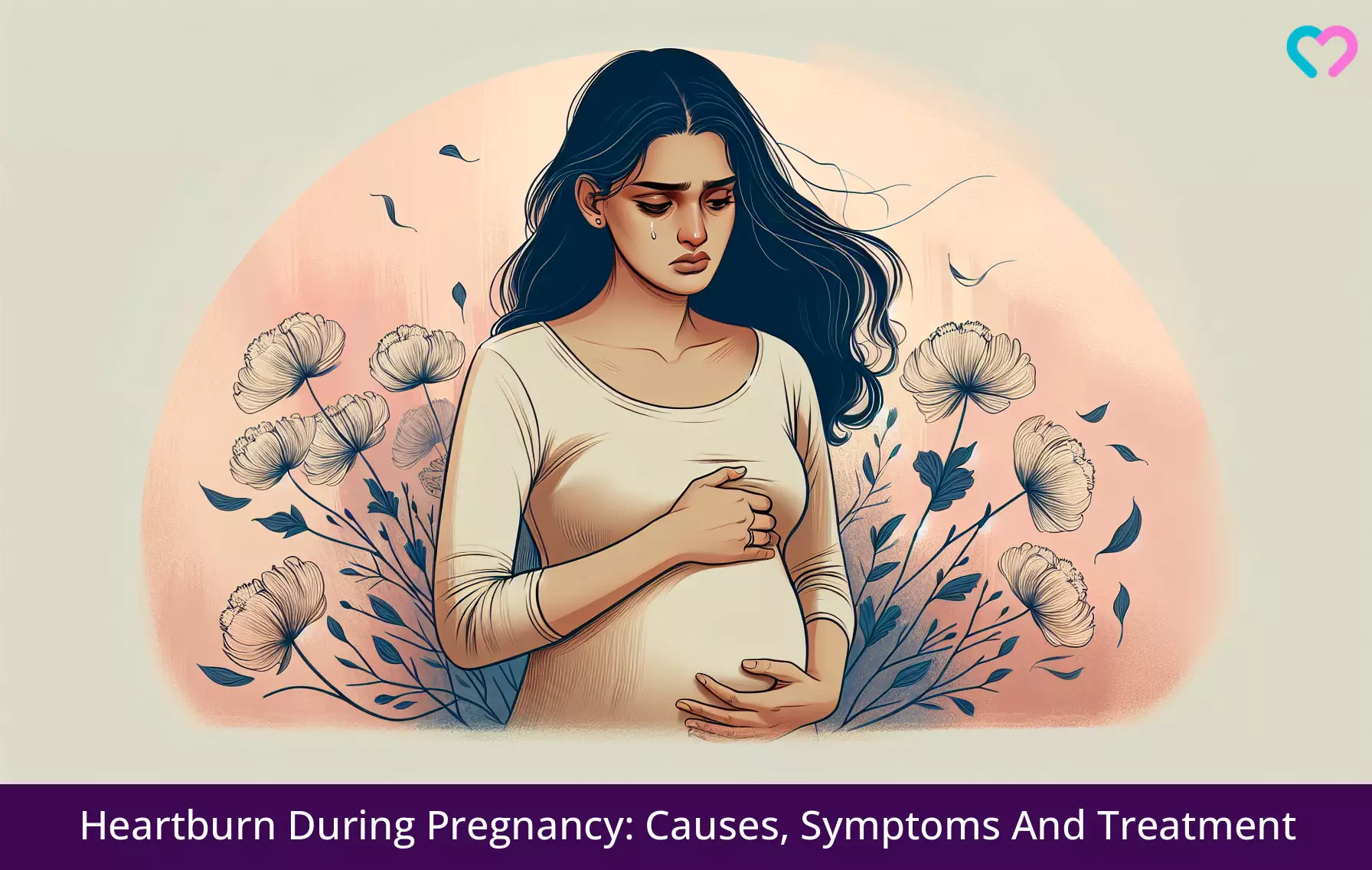
Image: Dall·E/MomJunction Design Team
Personal Experience: Source
MomJunction articles include first-hand experiences to provide you with better insights through real-life narratives. Here are the sources of personal accounts referenced in this article.
i. Management of pregnancy symptoms.https://ehomemakers-malaysia.blogspot.com/2018/08/management-of-pregnancy-symptoms.html
References
- Heartburn During Pregnancy.
https://my.clevelandclinic.org/health/diseases/12011-heartburn-during-pregnancy - Pregnancy and Heartburn.
https://www.stanfordchildrens.org/en/topic/default?id=pregnancy-and-heartburn-134-10 - Juan C Vazquez (2015); Heartburn in pregnancy.
https://www.ncbi.nlm.nih.gov/pmc/articles/PMC4562453/ - Scida Serena, et al.,(2018); Relationship between Helicobacter pylori infection and GERD
https://www.ncbi.nlm.nih.gov/pmc/articles/PMC6502218/ - Stuart Carne; Double-blind trial of mucaine in heartburn of pregnancy.
https://www.ncbi.nlm.nih.gov/pmc/articles/PMC1878433/pdf/jcgprac00004-0161.pdf - Indigestion and heartburn in pregnancy.
https://www.nhs.uk/pregnancy/related-conditions/common-symptoms/indigestion-and-heartburn/ - Indigestion and heartburn in pregnancy.
https://www.pregnancybirthbaby.org.au/indigestion-and-heartburn-in-pregnancy - Ruth Law, et al., (2010); Treatment of heartburn and acid reflux associated with nausea and vomiting during pregnancy.
https://www.ncbi.nlm.nih.gov/pmc/articles/PMC2821234/ - Simerpal Kaur Gill, et al., (2009); The safety of histamine 2 (H2) blockers in pregnancy: a meta-analysis.
https://pubmed.ncbi.nlm.nih.gov/19051023/ - Simerpal K Gill, et al., (2009); The safety of proton pump inhibitors (PPIs) in pregnancy: a meta-analysis.
https://pubmed.ncbi.nlm.nih.gov/19491869/ - Feeling the burn? Tips to manage heartburn, GERD in pregnancy.
https://utswmed.org/medblog/heartburn-gerd-pregnancy/ - Pregnancy Heartburn? 7 Ways to Get Relief.
https://intermountainhealthcare.org/blogs/pregnancy-heartburn-7-ways-to-get-relief - Heartburn During Pregnancy.
https://americanpregnancy.org/healthy-pregnancy/pregnancy-health-wellness/heartburn-during-pregnancy/ - Reflux (heartburn).
https://app.magicapp.org/?language=en - Kathleen A Costigan, et al., (2006); Pregnancy folklore revisited: the case of heartburn and hair.
https://pubmed.ncbi.nlm.nih.gov/17150070/ - Foods to Avoid with GERD.
https://www.fishertitus.org/healthy-living/healthy-living-blog/2017/foods-to-avoid-with-gerd/ - Review article: the management of heartburn in pregnancy.
https://onlinelibrary.wiley.com/doi/full/10.1111/j.1365-2036.2005.02654.x - Valesca Dall’alba et al., (2015); Health-related quality of life of pregnant women with heartburn and regurgitation.
https://pubmed.ncbi.nlm.nih.gov/26039826/ - Raja Affendi Raja Ali et al., (2025); Review of recent evidence on the management of heartburn in pregnant and breastfeeding women.
https://www.ncbi.nlm.nih.gov/pmc/articles/PMC9066781/
Community Experiences
Join the conversation and become a part of our nurturing community! Share your stories, experiences, and insights to connect with fellow parents.
Read full bio of Dr. Pamela Adhiambo Muga
Read full bio of Vidya Tadapatri
Read full bio of Rebecca Malachi
Read full bio of Dr. Joyani Das













